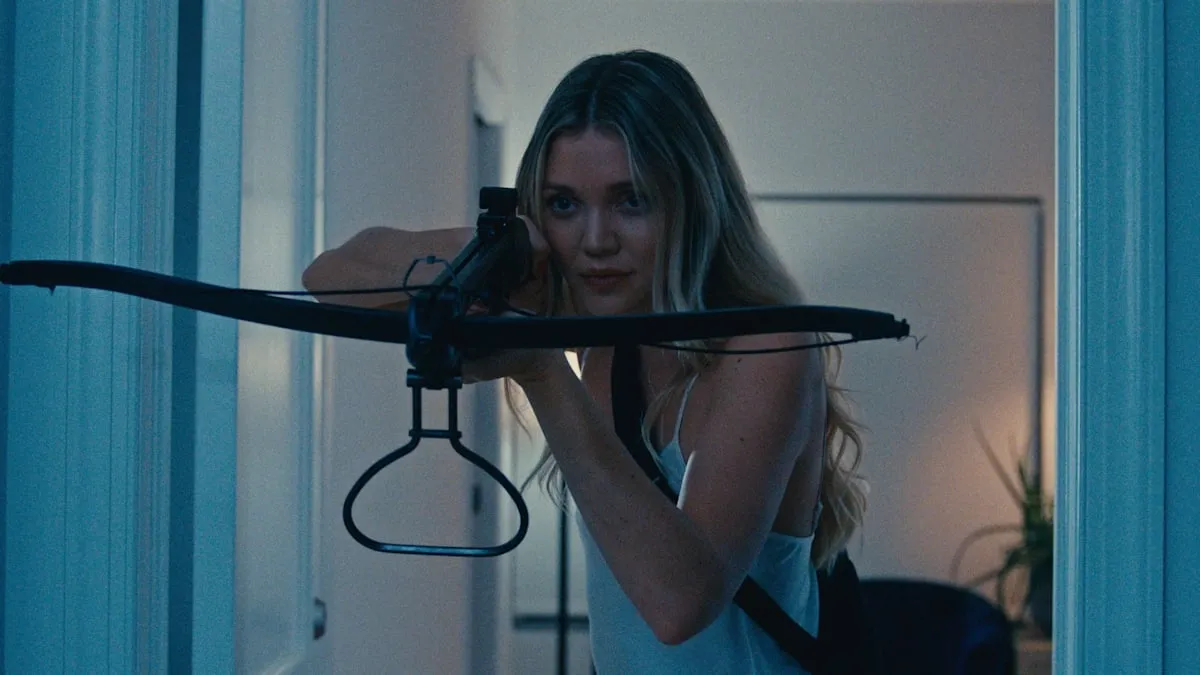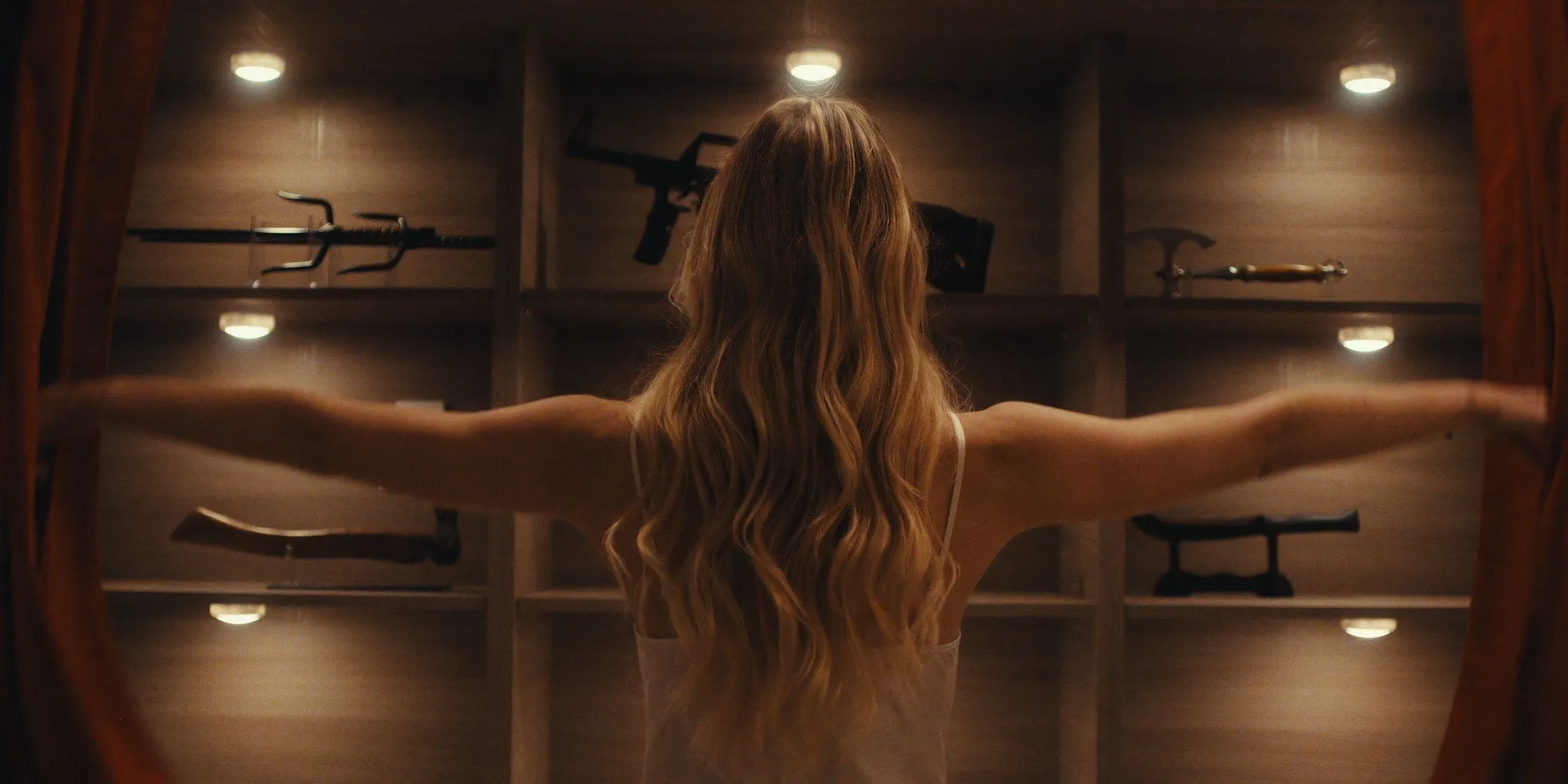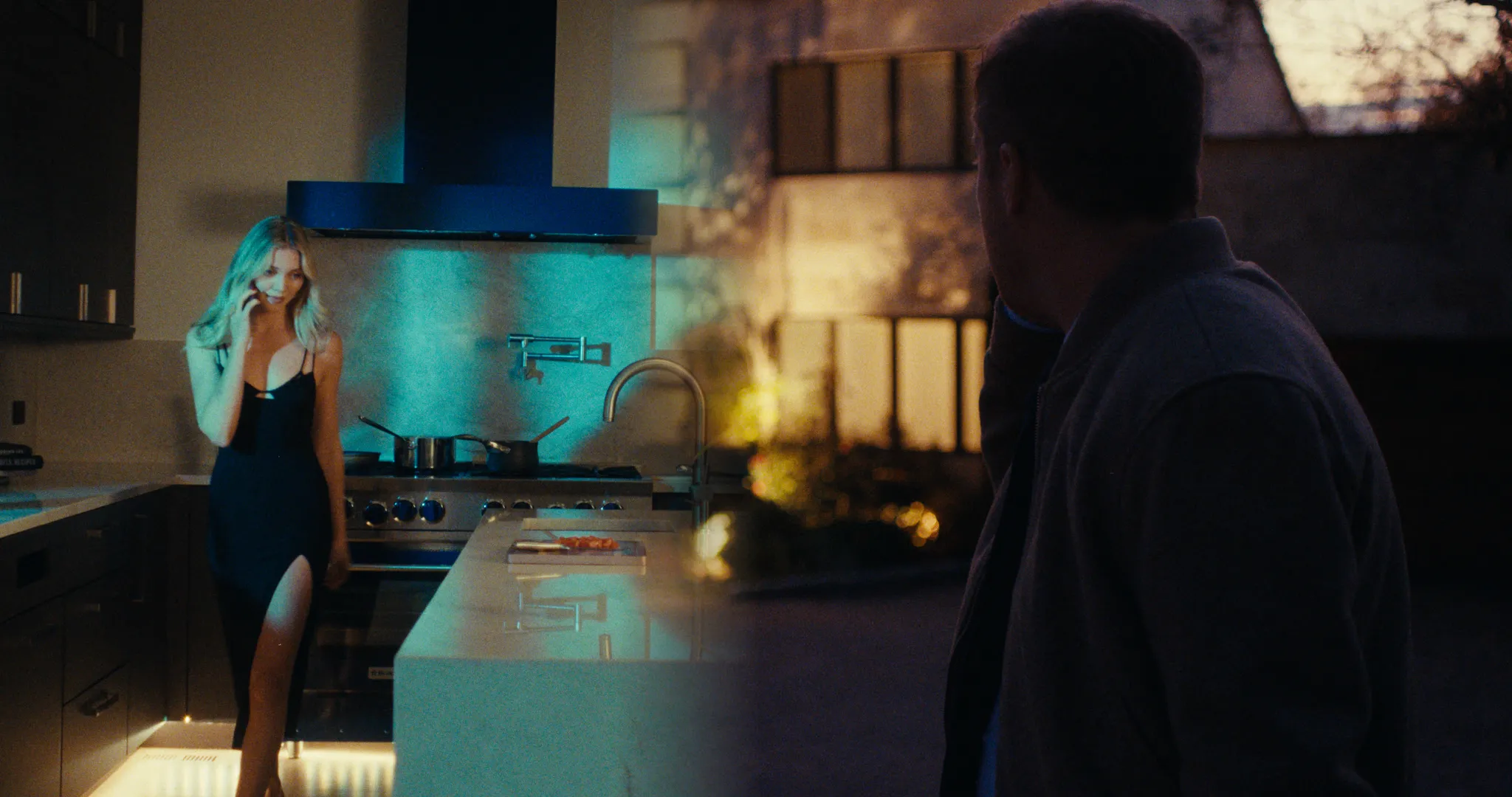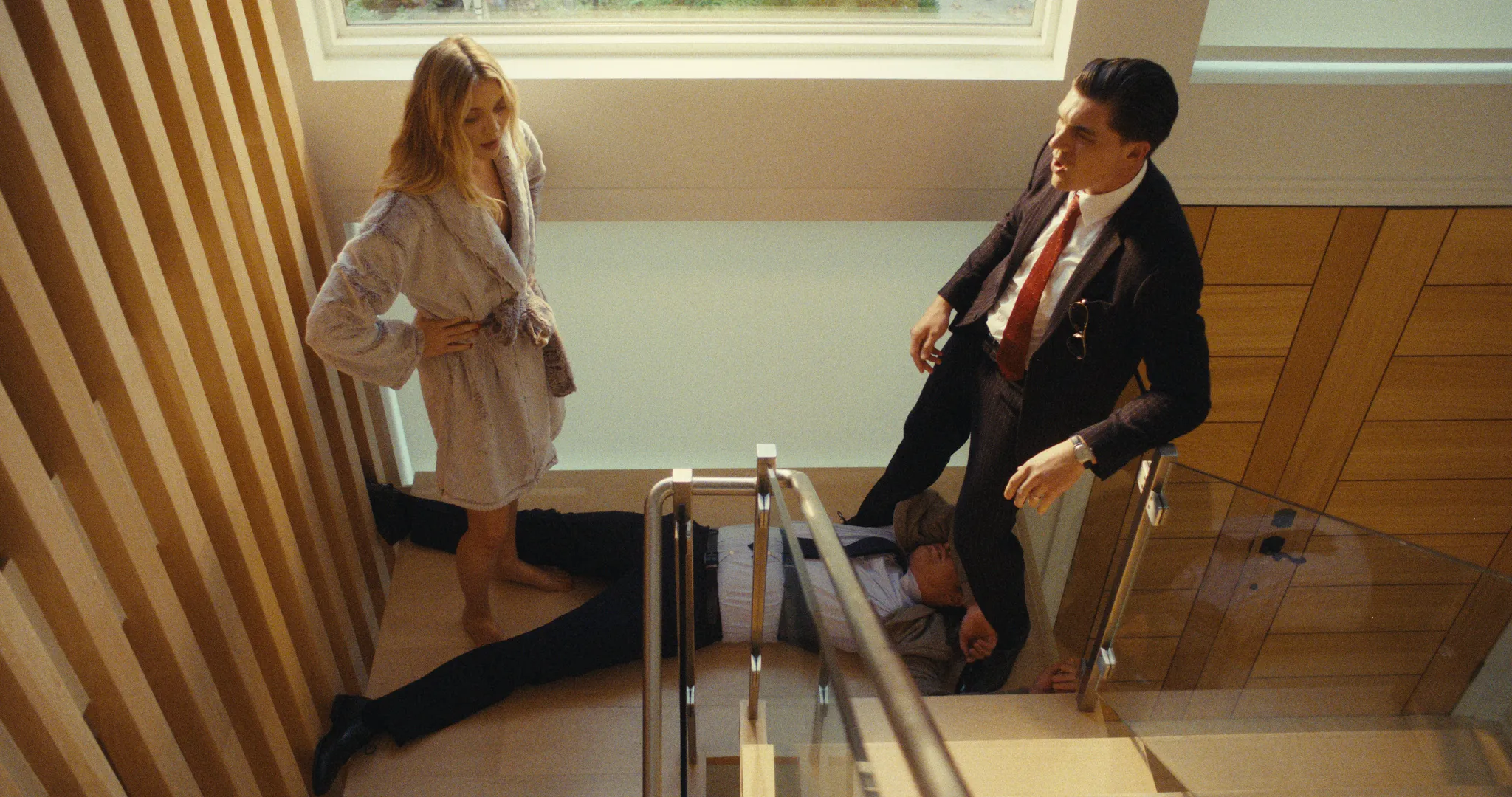“Love Bomb” is a suspenseful thriller that turns digital relationships into a dangerous game of manipulation and desire. It fits in well with the murky world of modern dating apps. The movie is about a dangerous love triangle between Anna, Tom, and Josh. These three characters are caught in a web of psychological mind games controlled by the Love Bomb app.
The story is about a date that starts as simple but quickly becomes more complicated. Anna and Tom look like a couple, and they’re using the app to trick Josh into a complicated situation. It’s hard to tell the difference between truth and performance. What starts out as a possibly steamy encounter turns into a twisted look at power, voyeurism, and people’s true intentions.
The background of “Love Bomb” is reminiscent of hot, tense erotic movies from the late 1980s and early 1990s. The film uses a disturbing soundtrack and style to create an eerie atmosphere that never goes away. The movie plays with people’s expectations on purpose by using the dating app as a plot device to explore more complex issues like consent, how relationships work in the social media age, and how relationships are performed.
The movie is just under 90 minutes long and promises a tight, surprising plot that keeps viewers guessing about what each character is really up to and what the Love Bomb app is really for.
Dangerous Digital Threads: Navigating Love Bomb’s Narrative Maze
The story of “Love Bomb” starts with an idea that seems too simple: Anna and Tom, who seem to be dating, use a dating app to set up a complicated trap for Josh. What starts out as a planned romance quickly turns into a tricky mind game where nothing is what it seems.
The way the story is told in the movie is meant to surprise viewers. At first, the story seems like a creepy meeting, but it quickly turns into an in-depth look at the Love Bomb app. Each character acts as a performer and a victim, making it hard to distinguish between real contact and planned manipulation. They say they’re making content for users, but is there something more sinister going on?
Red herrings placed strategically keep people off balance all the time. Just when you think you know why the characters are doing what they’re doing, the plot changes, adding new levels of complexity. Who is really in charge of the story? Does Josh know he’s playing a role, or is he just taking part? These questions create tension, making each story shocking and interesting.
The last act turns out to be the most unified part of the movie. Here, the story’s many loose ends start to come together, with Anna, played by Jessie Andrews, standing out as a particularly strong and determined character. Without giving away important story points, the ending satisfies and unnerves what could have been a simple thriller into something more complex and unpredictable.
Ultimately, “Love Bomb” makes the most of its short running time by exploring digital manipulation in a tense and twisty way that keeps viewers wondering until the end.
Crafting Tension: Guglielmo and Charles’ Cinematic Experiment
David Guglielmo faces the difficult task of directing “Love Bomb” with surgical accuracy, turning the movie’s possible flaws into its strengths. At first glance, having only three actors and a single setting might seem like a lot of restrictions, but Guglielmo uses them to dig deep into his characters’ minds.
The way the director is working makes me think of old-fashioned chamber plays, where every move, glance, and small talk has a lot of meaning. By being both the casting director and the director simultaneously, Guglielmo provides a controlled space where each actor can really inhabit their role. The one big set is less of a space limitation and more of a pressure cooker for building up mental stress.
The script by Kathy Charles cleverly combines modern worries about technology with a classic thriller plot. The dating app isn’t just a plot device in her play; it’s also looked at as a complicated way to control people. The dialogue is right on the line between natural talk and planned psychological warfare, making it hard to know what the characters think.
Charles is especially good at weaving modern social media anxiety into a story that feels both current and timeless. The screenplay makes the point that in our highly connected world, every encounter and relationship could be a show for an audience that we can’t see.
By combining psychological depth akin to noir with modern anxiety about technology, Guglielmo and Charles create a unique movie experience that defies the rules of typical thrillers.
Psychological Chess: Performers Navigating Digital Deception
Three actors transform “Love Bomb” from a potentially ordinary thriller into a mesmerizing psychological exploration. They all give their parts depth.
Jessie Andrews plays Anna, who steals the show as a hunter and puppet master. Her performance is electric, combining calculated drive and raw intensity. Before Andrews, Anna might have been a typical femme fatale. But she turns her into a complex character whose every move hints at a hidden plan. She’s fierce without being cartoonish and vulnerable without looking weak. This careful balance makes people always wonder what her real goals are.
Zane Holtz plays Tom with a frightening sophistication that makes the character more than just a stereotypical sociopath. His performance makes it seem like there are layers of trickery beneath the smooth surface. Holtz gives the part a quiet dread, making the character look good on the outside, but betrayal is something much more dangerous. Every move and word Tom uses hints at darker currents beneath his smooth surface.
Josh Caras plays Josh, the classic lonely stranger, in a way that is painfully true to life. His performance shows how vulnerable someone is who wants to connect but is always unsure. Because of how Caras plays Josh, Josh is both likeable and a little uneasy to watch. He could be a victim or a sneaky operator.
The way the three of them engage makes a situation like psychological chess, where power always shifts. Their connection works like a complicated algorithm, with each interaction changing the balance of power. There isn’t a clear leader among the characters; instead, they move in a hypnotic dance of digital manipulation.
What comes out is less of a standard story and more of a complex look at how people connect in a time when everything can be fake, staged, and ultimately uncertain.
Digital Predators: Unmasking Modern Connections
“Love Bomb” goes from a suspenseful thriller to a harsh critique of relationships in the digital age, where every interaction is seen as a performance and every link as a trap.
The movie closely examines voyeurism and shows how technology has turned watching other people into a planned power play. Cameras are no longer just passive recorders; they are now active players in a complex psychological manipulation. Each character knows they are being watched and being watched at the same time, making it hard to tell the difference between a real relationship and a performance.
The Love Bomb app is a scary metaphor for how people connect romantically today. It’s not just a dating site; it’s also a sneaky way to make money from people’s weakness. The app turns closeness into content, relationships into transactions, and personal ties into moments that could go viral. It’s not just dating; it’s a high-stakes digital battle arena with the main goal of staying emotionally alive.
Cybercrime takes the lead as more than just a plot technique. People are deeply paranoid about using the internet, and the movie plays on that fear by saying that behind every digital connection is a possible threat. It’s possible that every swipe, message, and match could lead to something much more dangerous than a romantic meeting.
What emerges is a deep look at how technology makes people feel alone in the modern world. The movie Love Bomb makes the point that in today’s highly connected world, real human connection is becoming less common. Instead, performative exchanges are meant to get people involved while minimizing emotional risk.
The movie doesn’t just tell a story; it’s also a dark reflection of our digital lives, raising uncomfortable questions about truth, permission, and how the lines between private and public life are becoming less clear.
Sonic Seduction: Scoring Digital Darkness
“Love Bomb”‘s music is like a time machine that takes listeners straight to the hot, tense world of erotic tales from the late 1980s and early 1990s. The music doesn’t just go with the story; it becomes important, whispering dark promises and underlying psychological pressures.
From the very beginning, the music, which sounds like it came from a film noir, sets an ominous mood. These aren’t just background noise; they’re an audio dance that shows how the characters’ complicated relationships affect us. Sometimes the music is smooth and seductive, and other times it’s rough and uncertain, just like the changes in the story.
This game’s sound design goes beyond simple scoring, creating an engaging experience that mixes music with a tense atmosphere. Each musical line sounds like it could be dangerous, turning everyday things into emotionally charged experiences. The music gives you a sense of what’s going on below the surface—the threats that aren’t said, the secret goals, and the constant power struggles.
What comes out is more than just background sounds. The music from “Love Bomb” becomes a character, manipulative, uncertain, and completely captivating. In this case, watching something changes from observing to a deep, sensory audiovisual trip through the dark alleys of modern desire.
Not only does the music back the story, it also shows its hidden heartbeat.
Visual Venom: Crafting Cinematic Seduction
The movie “Love Bomb” is a visual feast that changes the sexual thriller genre by creating a look that is both sexy and deeply psychological. The cinematography doesn’t just show the story; it becomes a character in the movie, giving the dark digital world life.
The color scheme has a very thin line between sultry and scary. Lighting becomes a part of the story by making shadows feel alive and dangerous. The single main location is turned into a psychic maze by the careful composition of each frame. The cinematographer knows that closeness can feel both suffocating and open in this digital age, and the composition shows this well.
The strange set design is more than just a background. Its character changes and breathes with how the other actors feel. Carefully placed elements give a sense of both limitation and limitless possibility, similar to how the figures interact with each other digitally.
The views of the camera become tools of psychological warfare. Close-ups show small facial expressions that say a lot, and wider shots show how the characters always perform, knowing they could be watched, recorded, or turned into material.
There is more to what comes out than just standard filmmaking. The art piece “Love Bomb” uses images to directly address modern worries about connection, spying, and how relationships are used for performance. Each frame is a carefully thought-out trap that draws viewers deeper into the darkness surrounding them.
Digital Deception: Breaking Thriller Boundaries
“Love Bomb” is a brave new take on the erotic thriller genre. It uses modern technology as a weapon in shocking and strangely familiar ways. The Love Bomb app isn’t just a plot device; it’s also a great metaphor for how digital communication can turn into a high-stakes psychological war.
In a typical thriller, anxiety comes from physical fights. But in this movie, the main source of tension is algorithmic manipulation. The app takes on a life of its own, a silent, smart being that turns human relationships into performative content. It makes a very sharp point about how technology has changed intimacy by turning every encounter into a possible sale.
The best thing about the movie is how honestly it examines how vulnerable people are in the digital age. The movie uses the Love Bomb app as more than just a plot device, playing on people’s worries about privacy, connection, and being watched.
Things don’t always land right. Sometimes, the story feels uneven, and some plot turns might not make sense. But these small problems aren’t as important as the film’s daring way of telling a story.
Ultimately, “Love Bomb” is a big step forward for the sexual thriller genre. It’s more than just a story; it breaks down how we relate to technology, desire, and achievement. If you’re looking for something different from typical storylines, this movie takes you on a scary, thought-provoking trip into the dark heart of digital connection.
The Review
Love Bomb
The thriller "Love Bomb" is a bold and controversial addition to the current landscape; it doesn't want to be limited by standard genre lines. The movie deeply looks at modern relationships, monitoring, and how people can be manipulated by using digital technology as its main plot device. The movie's strength is that it doesn't back down from looking at how technology turns personal relationships into performative content. With great work from Jessie Andrews, Zane Holtz, and Josh Caras, the movie goes beyond its possible flaws, creating a tense, surprising psychological experience that keeps viewers on the edge of their seats the whole time. "Love Bomb" has some small plot holes, but it makes up for it with creative storytelling, stunning cinematography, and a soundtrack that feels like a character in and of itself. It's not a thriller, but rather a smart comment on fear in the digital age and how weak people are.
PROS
- Innovative narrative structure
- Exceptional performances by lead actors
- Cutting-edge exploration of digital relationships
- Unique use of technology as a plot device
- Compelling psychological tension
- Sophisticated cinematography
CONS
- Occasional narrative inconsistencies
- Some plot twists may stretch credibility
- Potentially challenging for mainstream audiences
- Explicit content might limit broader appeal






















































